Together, birds, butterflies, and insects are vital to the Canadian agricultural system. But recent declines in bird and butterfly populations may be early signs that something is going wrong. Two new grants will help to determine the nature and scope of these changes.
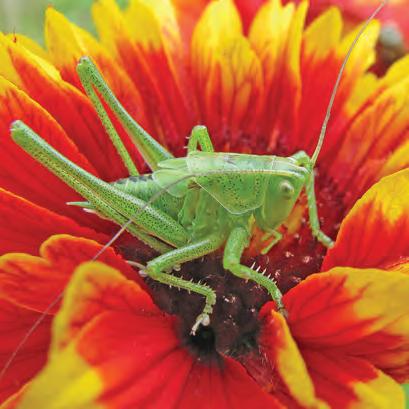


BURMAN INVESTIGATES
Fall 2023 Volume 6 No. 1 BURMAN UNIVERSITY MAGAZINE
An Affair of the Heart 4 | The Makerspace 6 | Birds, Butterflies, and Bugs 10 | Outdoor Learning 14 Choral Union “Splendor” Tour 16 | Ministry Through the Lens 18 | Robert’s Miracle 21
BURMAN UNIVERSITY MAGAZINE
EDITOR
Renate Krause
DESIGNER AND PHOTO EDITOR
David J. Kinsey, Alexander & Sydney, UBA
CONTRIBUTORS
Carole Anderson
Leonardo Barboza
Keith Clouten
Lenna Cordett
Robert Coupland
Adam Deibert
Jr Ferrer
Emmanuel-Olivier Jacques
Kevin Kiers
David Kinsey
PHOTOGRAPHER
Jr Ferrer
Delano Lewis
Andrea Luxton
Louicius Michel
Wendolin Munroe
Eric Rajah
Stephen Reasor
Ron Schafer
Eduardo Solá
Wilmer Tenerife
Canadian Government Grant Awards
Two Canadian government grants totaling more than $500,000 fund research on environmental toxins affecting bird and butterfly populations. The studies are headed by Professor Delano Lewis in the biology department.


ABOUT THE COVER
According to the South Dakota Corn Growers Association, “Some 85 percent of all flowering plants need help from pollinators, including 1,200 crops. Eighty percent of all plant pollination is by bees, butterflies, birds, and beetles.” Environmental toxins are threatening agriculture in Alberta.


TO MAKE A GIFT
Gifts in support of Burman University may be made at www.burmanu.ca or phone 403.782.3381 x 4161
VISIT US ONLINE AT www.burmanu.ca | Facebook: Burman University
Instagram: @burmanuniversity | Twitter: @burmanuniv
© Copyright 2023 Burman University
Burman University Magazine is published two times yearly by the Burman University, Office of the President, 6730 University Drive, Lacombe, Alberta T4L 2E5.
Burman University is a Seventh-day Adventist institution.
It's reliable, economical, and adorable, but for a 1,136 km commute, this will never do.

You could call the Burman library MAKERSPACE a creativity generator. It has multiple resources for developing new things, ideas, processes, perspectives, and more.
Singin' in the Rain
16
Nine of the 45-member Choral Union Tour needed some drying time after a drenching rain in Peggy's Cove, Nova Scotia, brought their sightseeing plans to a halt.

VOLUME 6, No. 1 Fall 2023
10
16 6 20
Fall 2023 Volume 6 No. 1 BURMAN UNIVERSITY MAGAZINE Together, birds, butterflies, and insects are vital to the Canadian agricultural system. But recent declines in bird and butterfly populations may be early signs that something is going wrong. Two new grants will help to determine the nature and scope of these changes. BURMAN INVESTIGATES An Affair of the Heart 4 The Makerspace 6 Birds, Butterflies, and Bugs 10 Outdoor Learning 14 Choral Union “Splendor” Tour 16 Ministry Through the Lens 18 Robert’s Miracle 21
Olympix • Acronaires
1973-2023
In this issue
On tour and at home games, Burman University's acrobatic team, the Acronaires (formerly the Olympix), has thrilled and inspired audiences for the past 50 years!
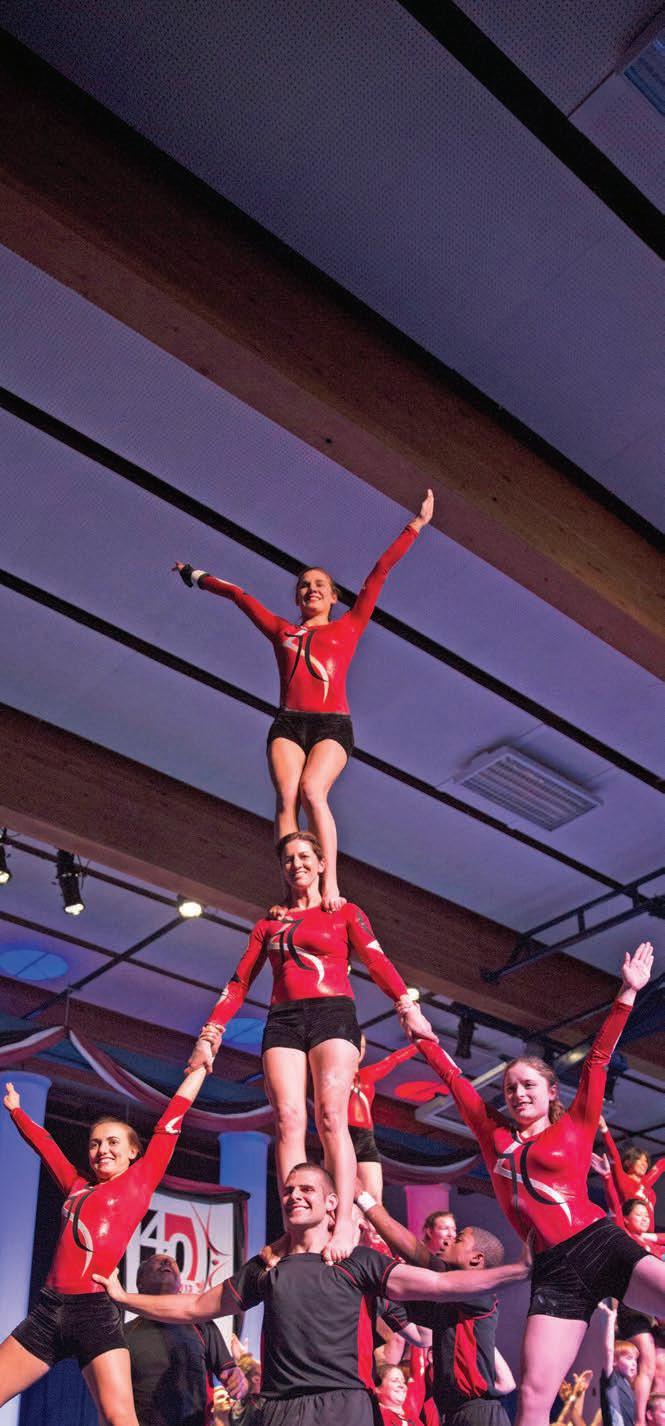
A weekend of celebration and reunion is planned for March 8-10, 2024.
Coach Ron Schafer says, "We hope to have hundreds of former team members return for this major event." All former team members are invited to send their contact information to rschafer@burmanu.ca or call/text 403-3916909. If you know the whereabouts of former members and have their email addresses or phone numbers, please share those also.
To Register: www.burmanu.ca/acronairereunion
1 | Fall 2023 2 President’s Message 3 Vital Perspectives: Andrea Luxton 4 An Affair of the Heart: Alison Down 5 Pastors Conference 6 Campus News 7 Campus News 8 Homecoming 2023 9 Burman in Brazil 10 Biology: Birds, Butterflies, and Bugs 12 School of Business 14 School of Education: Outdoor Learning 16 Music: "Splendor" Choral Union Tour, Celebrating Achievements 18 Religious Studies: Ministry Through the Lens 20 Psychology: When Values Trump Convenience 21 Alumni Focus: Robert's Miracle 22 Alumni Profiles 24 A Tribute to Bob and Myrna Tetz / IN THIS ISSUE /
Burman's Acrobatics Team Golden Jubilee Reunion
Whenever I walk through this campus, I can’t help but feel grateful. The grass-covered hills of more than a century ago have grown a crop that has shaped our world. The evidence of that is brought home even more forcefully during our annual homecomings. Meeting with alumni and friends, hearing their stories, celebrating their commitments and successes, and listening to their advice and plans is invigorating and faith-inspiring.
At Homecoming 2023, I met with the President’s Circle to express my gratitude for their financial commitments to Burman. Each member of this group has pledged an annual gift of $2,500 or a life-time gift of $25,000. I wondered (not for the first time) what their answers would be to the question, Why do you give? So I asked.
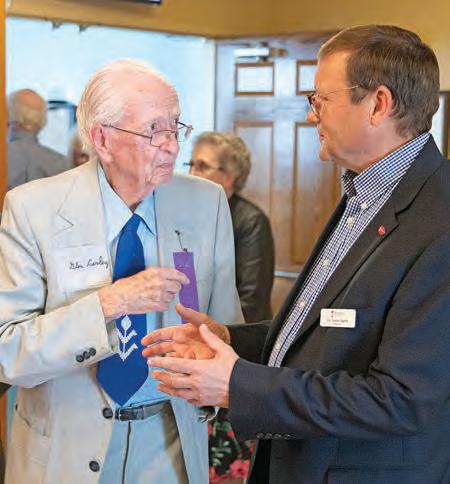
What impressed me most about their answers was that they had nothing to do with how much someone could afford to give.
One mentioned a sense of gratitude “for what this school taught my children.” Another commented, “Burman has given so much to me. I want them to dare to dream.” Someone else replied, “Burman had so much value to me; I want to make a difference in young lives.” Several spoke of the importance of Burman as the only Adventist postsecondary school in Canada. They want to ensure that the Church in Canada continues to be strengthened by those trained to serve. Still others spoke of their gift as an investment in young people, the impact of which will be their legacy.
As I reflected on these answers, it occurred to me that they are likely no different from those anyone would give for supporting Burman University, no matter the amount. Whether the motivation is gratitude; or the desire to make a difference; or to invest and make an impact across Canada, across the world, and across generations, the Hilltop has been blessed. Over the years, thousands of faithful supporters have believed in the young women and men who study and train here. And they have demonstrated that belief by their generosity.

Throughout this magazine are many stories of how current and former students are shaping the world. As you read, I invite you to see in each one an example of how you, too, can further God’s work through your support.
Whatever your reason for giving, know that with each gift you are making a difference.

2 | Burman University Magazine / PRESIDENT’S MESSAGE /
At Homecoming Dr. Agrey spoke with President's Circle member Glen Carley (HS '48) about the many recent advances made possible by the group's generous support.
Part Two
By Andrea Luxton
I was just 18 and heading off to university when, at a summer camp in South Wales, the then-Principal of Newbold College asked me whether I had considered studying at Newbold College. It was very easy to answer, “No.” After all, my plans had been made, and why would I go to Newbold when I could go to a British university? End of conversation.
Roll on six months: I was at university and doing fine academically. I was engaged in the local church. But I knew something was missing. I had studied at an Adventist Christian high school and had two Adventist teachers in my family. So maybe that made me more attuned to what my study of literature was lacking: a quality and context I had taken for granted before. At the time, I couldn’t define the missing piece, but my dissatisfaction led me to leave university and transfer to Newbold.
Now, more than 45 years later, I have to say that this was the most life-changing decision I have made. The story of my life would read very differently. I would not be doing what I am doing now. In writing this, I am not saying that this is the choice everyone can or should make. But I am saying that Adventist higher education, especially in very secular environments, is absolutely critical to the life and future of the Seventh-day Adventist Church.
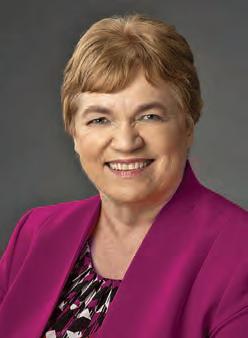
First, education is never taught in a vacuum. There is always an underlying value system driving what is taught and how it is taught. These values may not always be visible, but they are there and, whether we like it or not, they do impact the way students learn to think and the

Know Your WHY
worldviews they develop. This is particularly true in higher education when underlying philosophies and theories frame the education process to a greater and greater degree. The challenge is that it may not be until well into a program that a student is able to discern what frame a professor is using. It is even longer before it can be critically evaluated. We need employees and lay persons in the Church that understand their professions and the key issues of society through a mature mindset of faith. That is what Adventist education does.
Secondly, a community of Christian scholars is a safe place to wrestle with difficult challenges of the intersection between faith and our intellect. The result: stronger, more resilient Christians who are able to live faithfully in the secular community around them. How do I know that? Because I have had the opportunity to speak to countless students who testify to that experience.
Finally, a Christian higher education helps create a network for unparalleled lifetime support. It is easy for young people to become isolated from others in their faith community. An Adventist university provides great opportunities for students to meet friends, even potential life partners, from around the globe. This broadens a student’s perspective and allows connections that open opportunities for greater service as well as greater community.
Christian education changed my life. As teacher, principal, and president, I saw how it also changed the lives of many others. Times change, the ways we do education change, but the core nature of Seventh-day Adventist education remains the same.
3 | Fall 2023 / VITAL PERSPECTIVES /
Andrea Luxton served as professor of English, vice president for academic administration, and president of Canadian University College (now Burman University).
Dr. Andrea Luxton, then president of Andrews University and former president of Burman, reflects on her own academic journey and on the critical importance of Adventist higher education for the Seventh-day Adventist Church.
Alison Down may not be an alumna of Burman University, but she has a special connection to the Hilltop. Her first encounters with the Burman campus were for the graduation of her nephew Matthew Whitty (U 2003) and niece Jennifer Whitty (U 2005). During those brief visits, Alison recalls, she was impressed by what she saw. But shortly after her niece’s graduation, an unusual chain of events would lead to her own first-hand experience with the Burman community.
special place in her heart. “The Burman community opened their doors to me so I could get my degree. I’m proud that we have this Adventist university in Canada.”
Pride in Burman University and a heart for the students led Alison to strengthen her support through a unique commitment. “After being on the campus, God impressed me to include Burman in my regular giving,” she recalls.
An affair of the heart
In the absence of a pastor at her local church, Alison, a retired nurse, was approached by her conference ministerial department and asked to “hold the fort” until a new pastor was appointed. As the months stretched into years, Alison found herself not only leading church services, but giving Bible studies and preparing candidates for baptism. “It got to the point where I was calling the conference on a regular basis for outside pastoral support.”
As a result, Alison was ordained as an elder in 2010 and authorized by the conference to perform local pastoral duties. When leading Bible studies reached beyond her local church to the remote First Nations communities in northern Ontario, she felt the need for further education. This led her to pursue a Master of Arts in Pastoral Ministry (MAPMin) from Andrews University, which offers courses twice a year at Burman.
From 2013 to 2018, Alison spent two weeks on campus each spring and fall for the course sessions. During that time, she reconnected with friends living in the area, attended the College Heights church, and engaged in campus life. “The whole campus was so welcoming, especially the students. I spent a lot of time at the library, and they were so helpful to me—even with my white hair,” she recalls with a smile.
Since obtaining her MAPMin degree, Alison has continued pastoring and leading Bible studies in the community. Though she doesn't return to the Hilltop often, the university holds a

She spoke with Diane Southcott, Director of Advancement, who helped Alison set up a monthly donation to the university’s student aid fund. Though she had given occasionally in the past, she wanted her support to be more intentional. “I know that it’s a continuous need, so I have committed to continuous support,” she says. Her monthly donations over the past ten years have allowed many students to share in what she experienced during her time on the Hilltop.
Reflecting on why she gives, she says simply, “Burman is an amazing school, and I never want to hear that someone can’t attend for lack of support.”
By E-transfer etransferdonation@burmanu.ca

4 | Burman University Magazine / CAMPUS NEWS /
"I never want to hear that someone can’t attend for lack of support.”
Online www.burmanu.ca (select “Give”) By Mail Cheque payable to Burman University (write “student aid” on the memo line); send to Burman University, 6730 University Drive, Lacombe, AB Canada T4L 2E5 By phone (403)786-2533 (Advancement Office)
Join Alison Down by adding your gift to the fund that makes it possible to provide financial aid to many deserving students to enroll at Burman: Alison, pictured in Vacation Bible School attire, teaches children about the Christian life.
Alison Down
With the theme of “Restored and Empowered,” the SDACC’s aim for the summit was to provide opportunities for sharing, learning, connecting, and networking across the Canadian Adventist ministerial landscape. The church’s leadership sought to stimulate renewed commitments to ministry, revival, and strengthening skills. They also aimed to encourage close collaboration as pastors minister to congregations across Canada.

"Restored and Empowered"
Fourteen years after hosting the first Seventh-day Adventist Church in Canada (SDACC) Ministerial Summit in 2009, Burman University once again became a campus of pastors as 316 SDACC clergy members descended on the hilltop from July 2 – 5. With family members, presenters, exhibitors, and SDACC staff in attendance, more than 480 made Canada’s Seventh-day Adventist university their home for a few days.
Burman’s hospitality team was led by Dr. David Jeffrey, registrar, and Janelle Sullivan, office manager for marketing and enrolment services. Logistics, such as coordinating arrivals and transportation of summit participants to and from the Edmonton airport, required careful and minute attention to detail. Pastor Cyrill Millet, SDACC’s executive secretary, worked closely with the team to ensure that no one was left behind. The team also provided a shuttle service for all those participants who stayed off-campus in various Lacombe hotels.
Hospitality and service was the focus for all Burman faculty, staff, and students as they transitioned from their regular workload to preparing for the ministerial summit. The days leading up to the summit and then throughout the event were busy ones. The Burman campus was transformed into a convention centre with the church and classrooms as venues for seminars and presentations. Normally, residence hall deans take time over the summer to upgrade facilities and prepare for the fall term. But this year, the deans and their student workers prepped tirelessly to transform the residence hall into “Lakeview Hotel.” And the cafeteria was tightly
organized to serve over four-hundred patrons in the short times scheduled for meals throughout the day.
With such a captive audience on campus—many of whom were there for the first time—Burman sought to acquaint their visitors with the academic, spiritual, and social opportunities for students at Canada’s only SDA university. On Monday evening, retired former President J. D. Victor Fitch gave his testimony during a special presentation. He shared how being on campus as a student had shaped his life. Here he committed his life to God. Here he met his life partner. And here he started his influential career in Christian education. Following President Fitch’s moving story, several students and alumni shared their testimonies as well. The session ended with current students Dennalia Fray, fourth-year education major, and Emmanuel Jacques, third-year religious studies major, describing their experiences of growing to become campus leaders.
After a few busy and exciting days, SDACC pastors left the hilltop as suddenly as they had come to make their way back to their districts across Canada. Burman President Loren Agrey says, “It is our hope that the hospitality our guests experienced and the friendships they formed will give them confidence in letting their churches know that Burman University, Canada’s Seventh-day Adventist university—God’s university—is a place where students can come not just to grow to become leaders in their professions and communities, but, most importantly, to grow in their relationship with God.”
5 | Fall 2023 / CAMPUS NEWS /
Burman Hosts 2023 SDACC Ministerial Summit
About Creativity: Creativity is the act of turning new and imaginative ideas into reality. It is characterised by the ability to perceive the world in new ways, to find hidden patterns, to make connections between seemingly unrelated phenomena, and to generate workable solutions. Creativity Network

The Makerspace
The Burman Library was designed to generate a sense of joyfulness and intellectual purpose whether it be in spaces for students, faculty, and community friends to meet, read, and study, or to experience the newcomer to the twenty-first century library, the “makerspace.”
technician, reports that the library staff have even printed replacement parts for plumbing, electrical, and automotive purposes, and more. The laser cutter/engraver is also popular—especially with the art department. Students and faculty have used it for many projects, including stencils and cutting/engraving in both wood and acrylic. It is also used to create very practical objects such as signage.
In preparation for Burman’s second annual research fair, students took advantage of the large format printer that is capable of printing high-quality, poster-size documents at far less cost than what is available commercially. And School of Education classes meet regularly in the makerspace to use the Cricut machine for classroom displays, bulletin boards, stencils, and other objects that are usually available in teacher supply stores at considerable cost.
One of these tools is the virtual reality (VR) headset with a number of applications for both educational purposes and entertainment. For instance, art classes have used virtual paintbrushes to create threedimensional paintings suspended in air. And students from English classes have stepped onto the boards of a Shakespearean stage to understand the actors’ perspectives as they performed for an Elizabethan audience. The VR equipment has also been an able ambassador to the community at large at several sports summer camps for downtime activities between games.

Another tool is a 3D printer which has seen some heavy use from departments all across campus. As expected, students have printed visual aids for class projects, and professors have printed visual aids for their lectures. A calculus student printed a 3D expression of an equation. Mr. Tenerife, library

At this past summer’s pastoral summit, the Cricut machine was also used to create materials for the children’s sessions.
Burman’s library makerspace is clearly generating a sense of joyfulness and intellectual purpose. It is a vibrant, active place at the heart of the campus. Librarian Sheila Clark invites anyone interested to check out these various tools— and also the recently donated sewing machine—to discover new ways of expressing their creativity.
Turning spools of plastic wire into 3-dimensional objects is the basis for creating everything from repair parts to artworks on these printers. Learning the computer programming that controls the process is the hard part.
6 | Burman University Magazine / CAMPUS NEWS /
TALK
BEWARE THE MAKERSPACE! • CREATIVITY LURKS
TOOLS
DATA IDEAS SHARING
IN EVERY CORNER
Where creativity comes alive!
New Publication: The Sabbath Experience
A Day for Joy: Experiencing the Sabbath Day is Keith Clouten’s most recent book. It is not a theological treatise, nor is it an extended argument about days. Rather, Clouten, librarian emeritus of Burman University, invites his readers to join him in mining the depths of meaning in the day Seventh-day Adventists keep holy.
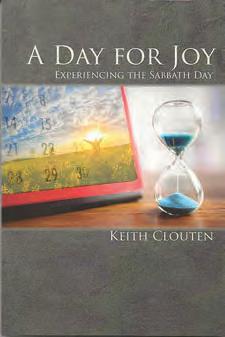
A Day for Joy asks, How can Sabbathkeeping be more about ‘experiencing’ than ‘doing’? It explores how the Sabbath, too often seen as a lawkeeping assignment, gives meaning to human existence on this planet and emphasizes the Sabbath experience as God’s gift: a space in time for joy.
Boat House and Dock on Lake Barnett
Several years ago, Burman’s administration approved in principle the construction of a boat house and dock close to Casey's Cabin on Lake Barnett. At that time, the plan was tabled for lack of funds. But now, Ron Schafer, director of physical education, says, “As the popularity of Casey's Cabin continues to increase, it is time once again to expand and improve the facilities.”
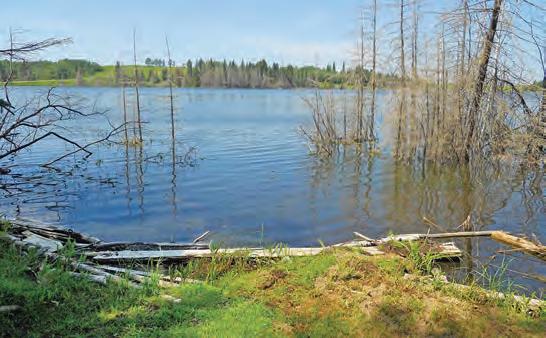
the boat house. But these projects are supported only by donor funds.” Those interested in this project are invited to contact Ron Schafer at the Burman University Physical Education Centre.
Leadership Success

“A successful person finds the right place for himself. But a successful leader finds the right place for others.” John Calvin
Maxwell
Successful leadership, as defined by John Maxwell, requires skill sets and attitudes that go far beyond natural talent and potential. In recognition of the complex life skills required of today’s graduates, a new cocurricular program became available to Burman University students two years ago in 2021.
The activities, programs, and learning experiences that the Saruk Centre for Leadership Development offers Burman students complement their academic training for the most holistic university experience possible.
With an enrollment of 30 students (15 from Burman and 15 from Red Deer Polytechnic), the Saruk Centre reports a highly successful year for 2022/23. Once a month, from Thursday evening to Sunday noon, students meet at a hotel in nearby Sylvan Lake to learn life and leadership skills.
It is anticipated that the boat house will accommodate approximately six canoes and six kayaks as well as some paddle boards and small paddle boats. These watercraft will be available to faculty, staff, and students of Burman University and to users of Casey’s Cabin.
Once all details are in place and final approval is given by the university’s administration, construction can begin. Schafer says, “The dock will be the first phase of the project, followed by
Some of last year’s cohort completed their undergraduate studies and have now started their professions or are attending graduate schools around the world. Others have transferred to institutions outside of Alberta. A record 19 of last year’s 30 students have already applied for a second year with the centre to continue learning from its systematic and organized approach to leadership training.
The program is available at no cost to students, and the centre anticipates that it will again be fully subscribed in 2023/24.
7 | Fall 2023
Site of proposed dock on Lake Barnett
/ CAMPUS NEWS /
Homecoming2023
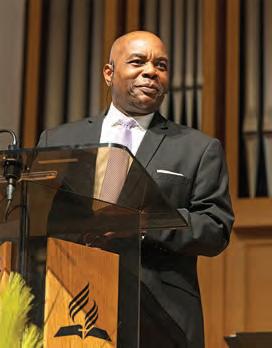
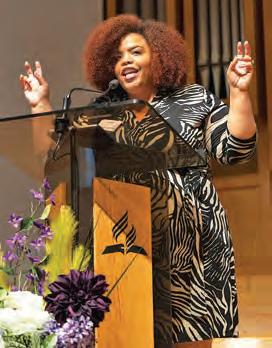



Burman was dressed for the occasion. The skies were blue, the fields were green, and the campus sparkled. Beth Dunlop, from the high school class of 1942, celebrated the honour of being the oldest alumna present, and the youngest, representing the class of 2045 (est.) and yet to be named, hadn’t made her (his?) world debut yet. Also celebrated were the members of the President’s Circle who engaged in spirited discussions at a special reception (see p. 2 for more details). Everyone had lots of opportunities to catch up with friends from years past at the lively Sabbath noon pot-luck lunch that followed a morning of inspiration. Honour classes met afterwards to share memories and plans for the future. Looking back on the unmitigated success of the busy weekend, Diane Southcott, director of donor and alumni relations, smiles, “Alumni Homecoming weekend is always fun! I’m already looking forward to next year!”
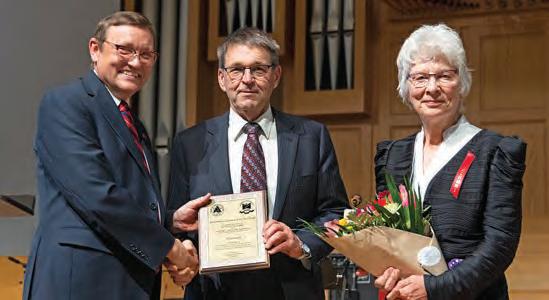

8 | Burman University Magazine / CAMPUS NEWS /
Eric and Candi Rajah join President Agrey to view the photograph and plaque honouring their leading role in the Shaping the World Campaign that led to construction and furnishing of the university's new library.
President Loren Agrey presents the Honorary Alumnus of the Year award to Elvin Saruk. Elvin Saruk and Grace Fedak (HS '69, U '70) are receiving recognition for their outstanding commitment to Christian higher education, including the establishment of the Saruk Centre for Leadership Development. (See p.7)
Lively discussions, remembering "old times" and sharing photos of grandchildren always accompanied the weekend's tasty meals.
Who knows what they were talking about, but engaging conversations often continued long after the plates were empty!
Chanda Nunes-Henry's presentation on Friday evening was "Change is Going to Come." On Sabbath morning, Steve Cassimy invited his listeners to "Come and See...Go and Tell."
On Another Note
Multidisciplinary Research at Burman
Collaboration in interdisciplinary research on the Burman University campus is growing a community of scholarly collegiality.
One example of such collaboration is that of Dr. Eduardo Solá and Ms. Julie Thompson, assistant professor of English. (See page 13 for another example.) They have been collaborating in scholarly writing since 2020 and have presented eight papers at conferences internationally.
In 2022, Solá and Thompson published their first article, "Facilitating Christian Spirituality in the Post-secondary Classroom: An Autobiographical Approach" (Revealing Jesus in the Learning Environment: In Celebration of Teaching, Avondale University Press). This year, they have an article in a special issue of Multicultural Shakespeare (in press), in which they discuss teaching literature within the Canadian educational system.
Burman in Brazil
The Burman University String Quartet, organized by Dr. Eduardo Solá and featuring three Burman University alumni—Heather Ensley, Josh Flynn, and Zoe McCormick— had a successful tour in Brazil.
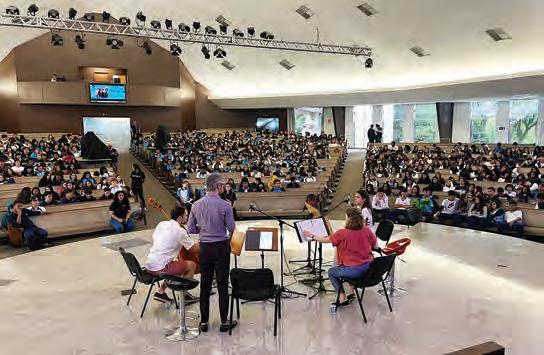
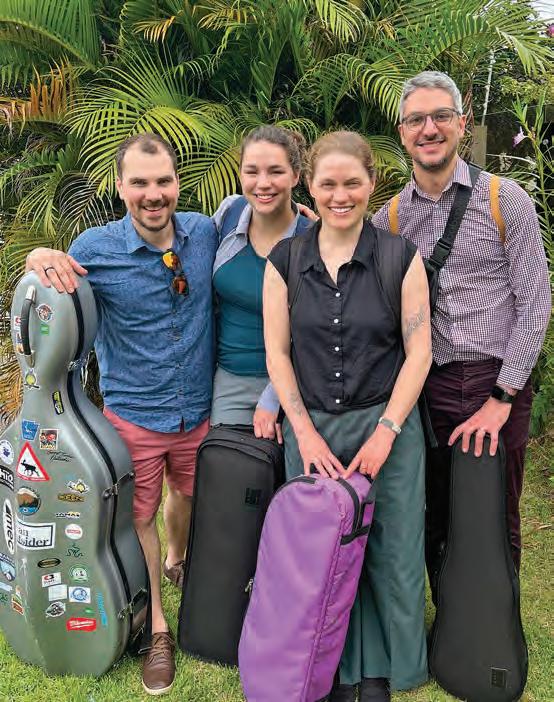
The May 2023 recruiting trip and the concerts presented were met with enthusiasm by Brazilian audiences, and Burman’s music faculty look forward to receiving more applications from international students as a result.
Dr. Eduardo Sola’s new monograph, Fugue Analysis: A Practical Guide by academic publisher Peter Lang, presents a novel analytical framework to eighteenth-century counterpoint. It offers a solution to the terminological inconsistencies between primary sources and an overall systematic approach. The volume, published in July 2023, can be used as a textbook or as a resource for music theorists. Dates and times for the release event and signature sessions will be available in the fall.

9 | Fall 2023 / CAMPUS NEWS /
The quartet arrives at Universidade Estadual de Santa Catarina (UDESC), a public university, where they present a master class to university students.
Burman Professor Publishes New Textbook
At the Universidade Adventista de São Paulo (UNASP), a university and boarding high school, the Burman group performs for high school students.
Birds, Butterflies, and Bugs

Their beauty notwithstanding, birds and butterflies play a key role in the agricultural health of our planet. Burman professor Delano Lewis is doing important work to help ensure the security of critical species. And "bugs?" Yes, they're important, too.

Ecological Interactions
A research partnership between Burman University and Ellis Bird Farm (EBF) is exploring the correlation between environmental toxin accumulation in insects and the reproductive effects on birds that feed on the insects in Central Alberta.
Two grants are funding this research project: a $567,895.71 grant over five years from the Natural Sciences and Engineering Research Council (NSERC), Canada’s federal agency that funds university-based research in natural sciences and engineering, and a $36,442.50 one-year grant from the Alberta Conservation Association (ACA).

As part of their conservation efforts, in the past EBF installed 500 nest-boxes for migratory birds to breed over an area of about 360 km2 representing diverse land use: mostly farmland but also (in smaller proportion) forest, wetlands and even urban habitats. Recent analyses show a decline in the number of boxes occupied by mountain bluebird breeding pairs, with causes still unknown.
Dr. Delano Lewis of Burman University has assisted EBF’s conservation efforts since 2021 by sampling insects around the 18 boxes where bluebirds nested that year as part of their ongoing monitoring of the birds’ reproductive cycle (i.e. number of eggs laid, hatching success, and fledgling success). Dr. Lewis also collected nestling feces for molecular analysis of insect DNA and chemical analysis. The NSERC and ACA grants (with Dr. Lewis as principal investigator) will advance this research more fully.

10 | Burman University Magazine / DEPARTMENT NEWS: BIOLOGY /
Photo by Maureen Carey
“Many species of migratory insectivorous birds are declining throughout North America, and the ecological processes involved are complex and difficult to disentangle,” Dr. Lewis explains. “Few studies have simultaneously investigated the link between bird reproduction, the presence of environmental toxins in the insects that these birds feed on, and the potential transmission of those toxins from insects to birds.”
This multidisciplinary, collaborative project is uniting the academic/scientific background of Burman University with the agricultural- and community-based background of Ellis Bird Farm to close the gap between applied science and end-users and decision makers. It will involve farmers, community members, and other stakeholders to find solutions that will mitigate the effects of environmental toxins on local wildlife through changes that will benefit all.
Lewis continues, “We are using field sampling and molecular techniques to overcome the existing barriers that separate academic conservation biology from policy makers and the general public. Collaboratively, we can decide on policy recommendations for sustainable agricultural practices.
“We thank the past and present site managers/biologists at Ellis Bird Farm, the staff at Ellis Bird farm, and the farmers and landowners throughout the area who allowed us access to the bluebird nests on their properties. This partnership can only reap benefits for all involved and the environment."
The project’s primary objective is for Burman and Ellis Bird Farm to engage the public in an activity that educates them about the importance of butterflies and their role as pollinators (necessary for a diversity of native plants) and conservation. Lewis says, “We anticipate an increase in participants’ appreciation for butterflies and increased appreciation for the habitats in which they exist.”

This objective is being fulfilled in two phases: 1) training community volunteers to become “certified butterfly counters” and 2) the butterfly count itself at EBF. More than 30 volunteers completed the training session.
Preparation for the project was careful and detailed: Five volunteers from Burman University and two EBF staff assisted Dr. Delano with creating plaques with directions, butterfly identification markings, and conservation- and butterfly-related fun facts. They posted signs throughout the trails and erected permanent signage to let visitors know more about the project.
The group also created two pamphlets: one for the “certified counters” and another for young children and other community members who did not complete the training but wanted to participate in the activity.
The “certified counter” training, led by Dr. Lewis, consisted of a PowerPoint presentation followed by an outdoor activity to practice counting and walking the trail. Once volunteer counters completed their training, they were ready to participate in the project.
The project commenced on May 1 with community volunteers and professional biologists. It concluded on September 15. Participants completed a pre- and posttraining survey to support their learning throughout the program and to confirm the anticipated outcomes.
The Citizen Science Butterfly Count

Lewis is also coordinating a second project at Ellis Bird Farm this summer: the Citizen Science Butterfly Count, sponsored by the Toronto Dominion Friends of the Environment Foundation. This volunteer-driven, community-based project teaches community volunteers how to identify and count a diverse array of butterflies.
Delano Lewis, associate professor of biology

11 | Fall 2023
Alberta’s Targeted Enrolment Expansion Program to Expand Admissions to School of Business
Burman University’s School of Business trains students in areas of general business management, accounting, international business, finance, human resource management, and other related areas where the demand for these skills is more than the supply. Dr. Louicius Michel, chair, reports, “One hundred percent of our graduates, as per our recent survey in 2021, are working, and 73.3 percent are employed in their preferred fields.”
According to Alberta’s Occupational Outlook 2019 – 2028, the province has identified more than 200,000 expansion and replacement job openings needing to be filled in the areas of business, administration, and finance. Related openings in sales and services will reach more than 275,000. Part of Alberta’s response to this astounding data is to offer grants to the schools in the province to expand their admission and graduation levels.
Because School of Business admissions were expected to increase, the school submitted its first grant application to the Alberta government’s Targeted Enrolment Expansion Program (TEEP) in 2022 and received $600,000 in grant funding over a three-year period. This year, the school applied for a second grant and was awarded more than 1.2 million dollars ($1,209,280) for the 2025/26 academic year.
Burman’s marketing and enrolment data indicate that learners' demand will be highest for accounting and human resource programs. One strength of Burman’s business programs is work-integrated learning. This is accomplished in two different ways. First, students are required to take a 3-credit internship course that expects a minimum of 180 hours of actual work experience in an organization. Second, the Capstone class, required of all business students, stipulates that they conduct a strategic diagnosis of an organization by observing and surveying its management processes. Students find placements anywhere in Canada or, for international students, anywhere worldwide.
Dr. Michel comments, “We do not anticipate a shortage of internship placements due to an increase of new students per year in our programs.”
A Path to Sustainability
The school intends to become strategically competitive. Three pillars of its strategic action are quality education, research and publication, and community service.
Some of the primary tools used to assess quality are the government’s strict and regular reviews of its programs, student feedback, academic oversight, employers’ evaluations
of its alumni, and faculty self-assessment. Affordability and access are enhanced with an entrance scholarship of $3,000 available to anyone choosing a career in business.

The School is also recruiting a new faculty member to provide a diversity of teaching experience and to enhance quality. See the job posting at https://www.burmanu.ca/sites/default/ files/Human%20Resources/Faculty%20-%20Business. pdf)
Capstone Class a Resource for Central Alberta Businesses
In their last year of studies, business students take a class that integrates the different content and functional perspectives of their entire four-year training.

12 | Burman University Magazine / DEPARTMENT NEWS: SCHOOL OF BUSINESS /
Some of the Class of 2023 celebrate with their business professors.
The Capstone course requires that they conduct a strategic diagnosis of a business. In 2023, students completed this diagnosis at Parkview Adventist Academy and Comet Welding, two local businesses. The presentations, to which the managers were invited, reported the strengths of each and made recommendations for addressing any perceived challenges. Any Central Alberta business wishing to be considered for this service may apply to the School of Business at busreception@burmanu.ca
Interdisciplinary Research in Economics Presented at East London University
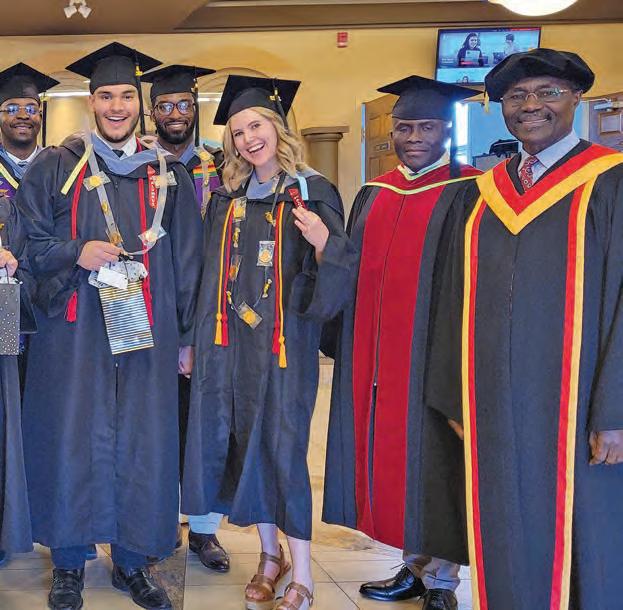
Dr. Louicius Michel, chair of the School of Business, and Dr. Kwame Adom, associate professor of business, presented at the Academy of African Business and Development Conference in London, England during a four-day event last May. They joined speakers and delegates from Barbados, Canada, Cameroon, Côte d’Ivoire, France, Ghana, Guinea Conakry, Haiti, Kenya, Netherlands, Nigeria, Pakistan, South Africa, Sweden, Tanzania, Uganda, USA, and Zambia.
Michel’s and Adom’s presentation, “Collective irrationality and economic crisis in a dynamic global business environment: Lessons from Western economic sanctions on Russia,” represented the collaborative research of Dr. Adom, Miss
Danae Brousson, also from the School of Business, Dr. Michel, and Dr. Chloe Weir, chair of the School of Education.
Their findings conclude that Western responses to the Russia/ Ukraine military confrontations made the global business environment more dynamic and volatile. The group posits that the measures amounted to a massive government intervention that disrupted the regular interactions of the market forces.
Their analysis indicates that “the sanctions have produced a boomerang impact on the initiators’ own economies in terms of an increase in the general price levels, a decrease in gross domestic products, financial instabilities, an impediment of trade flows, and a deterioration in living standards, among others.” The data suggest that “the collective sanction measures that led to economic crises did not comply with the rationalization process of the typical economic agent and initiated an era of greater instability in the global business environment.”
Alberta Funds Micro-Credential Programs
The government-funded micro-credential program is now in its second year. Last year’s 22 participants have gained new knowledge in eight different programs designed to provide knowledge in the practical skills employers are looking for in finance, entrepreneurship, and innovation: digital marketing, marketing strategies, bookkeeping, taxation, small business finance, internet security, mutual funds, and personal finance.
The online courses (check out the Small Business Centre website www.yoursmallbusiness.ca/microcredential for more details) are available to anyone wanting to improve skill sets or work on career entrance requirements.
Breaking News:
We have received the official notification from the Ministry of Advanced Education that our application to offer the following programs has been approved:
• Business Management Diploma (a 2-year program)
• Business Administration Certificate (a 1-year program)
These two programs are ready to accept students as of this fall term 2023-2024.
13 | Fall 2023
Outdoor Learning: Changing the Tide of Education

For the past 27 years, Kevin Kiers, assistant professor of education at Burman University, has been focused on sharing God's love through experiences with nature. He writes, “During this time, I helped develop and lead the Alberta Conference of Seventh-day Adventists’ Grade 5-6 Outdoor School. It just completed its 23rd year. I have discovered that using outdoor spaces to share God's love is meaningful and practical.”
Currently completing an advanced degree at the University of Alberta, Kiers chose for his doctoral dissertation to research outdoor learning for a better understanding of how teachers can have a successful outdoors teaching experience. What he discovered will profoundly influence Adventist outdoor learning throughout North America.
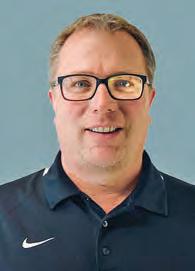
School-based Outdoor Learning in Alberta

Mr. Kiers explains, “Much has been written about the importance of using outdoor areas for teaching and learning, yet very little research is available on the experiences of K-9 teachers' involvement in outdoor learning (OL) and their success with it.” So he surveyed 140 teachers (all chosen for their participation in OL) from eight public school divisions in Alberta to discover their attitudes toward OL.
He found that almost all teachers believe OL has both mental and physical health benefits as well as social benefits. More than two-thirds of the group also reported some level of academic benefits such as improved problem-solving skills.
More than half believed spiritual benefits were also significant. One explained, “It’s good mentally. It’s grounding. It’s spiritual. My students are calmer.” Another added, “Attendance has improved vastly as compared to other years.”
14 | Burman University Magazine / DEPARTMENT NEWS: SCHOOL OF EDUCATION /
Examining K-9 Teachers’ Success
Given the perceived benefits, an increasingly large number of teachers are pushing past classroom walls—at least occasionally. Some of them are more successful than others. While most have the primary essential resource such as a grassy field, a park, or a forested area available within a kilometer of their school, almost two-third of the teachers interviewed rate their access to additional suitable outdoor teaching facilities (tables, seating, teaching facilities, etc.) as challenging. As would be expected, teachers with access to resources, equipment, and OL features were likelier to have a higher frequency of outdoor teaching experiences with their students.
Student behaviour in outdoor learning situations can also be challenging. Teachers reported that, similar to indoor behaviour, students need to be taught a teacher’s expectations for acceptable outdoor behaviour. Of the 139 responses to the question about comfort levels with student behaviours when outdoors, only two teachers were completely uncomfortable
with behaviour management when teaching outside, and, Mr. Kiers posits, may have had negative outdoor experiences themselves during childhood. Three out of four teachers reported that they were comfortable with student behaviour management when teaching outside. Interestingly, the same ratio of students wanted to learn outside. One teacher commented, “Students are taught how to be outside. It doesn’t happen by accident. It is taught.”
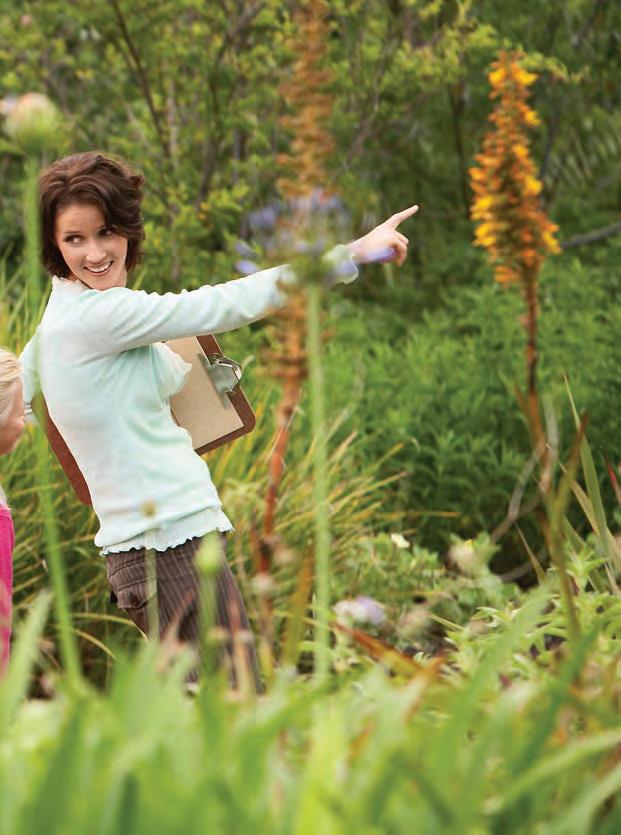
Next Steps
Mr. Kiers reports that several departments at the North American Division of Seventh-day Adventists (NAD) have shown great interest in his research and will be promoting outdoor learning experiences among teachers, pathfinder leaders, and camp staff. “They recognize that learning outside is a timely and relevant teaching method, supported by a strong belief that spending time in nature strengthens our connection with God.”
Along with a taskforce group of outdoor specialists from across the NAD, Kiers is developing 10 learning modules that focus on the key factors to ensure successful outdoor learning experiences. The modules guide outdoor teachers through the key factors for success and provide teaching resources and ideas. Upon completion of the learning modules, outdoor educators will have ready-to-use lesson plans. An in-person training program will occur annually in each of the NAD unions throughout North America to reinforce the learning modules and practical hands-on applications. Participants will receive a certificate and teachers will receive continuing education credit. Mr. Kiers adds, “We are exploring offering university course credits as well.”
When the collected data were analyzed, Mr. Kiers found six key factors that contribute to successful OL experiences among teachers:
Having the needed resources for OL
Feeling comfortable with OL
Feeling comfortable with behaviour management
Believing that OL has benefits
Having had positive outdoor experiences during childhood
Having school administrators who support OL

15 | Fall 2023
Choral Union Tour: "Splendor"
For twelve days, the Burman University Choral Union travelled throughout Canada’s eastern provinces on their spring concert tour, “Splendor,” conducted by Dr. Wendolin Munroe, professor of vocal and choral music at Burman University.
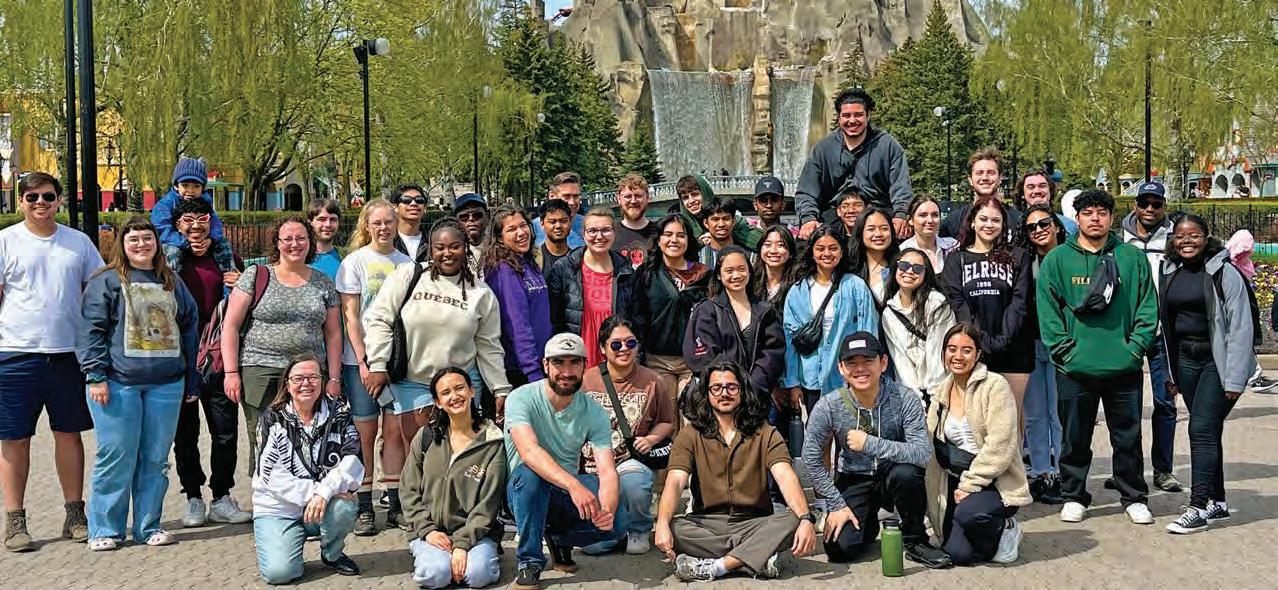

… from Dr. Munroe’s Diary
April 30/May 1 Our overnight flight took us to Halifax, Nova Scotia. After breakfast we visited Lunenburg and Peggy’s Cove despite heavy rain and being sleep deprived. (Many of us got soaked to the skin.) Later that evening, we presented our first concert at Sandy Lake Academy. The hospitality we encountered was incredible. Supper was provided for us before the concert, and then we had a wonderful time visiting with many Burman and Choral Union alumni. It was also a time to meet students from Sandy Lake Academy. After the concert, we were billeted to various homes for the night.
May 2 Today we visited some of the tourist sites in Halifax including the Citadel and the graveyard where many of the Titanic passengers had been buried. We later took a rest stop at the Five Islands lighthouse on the Bay of Fundy before presenting our second concert at the Moncton, SDA Church where we were warmly welcomed and hosted.
May 3 After crossing the Confederation Bridge to Prince Edward Island, we visited the Anne of Green Gables museum and the city of Charlottetown, PEI. Some of the students took time to sing at a local cathedral—a tradition BU students on tour started some time ago. Later in the evening, we again enjoyed maritime hospitality with another lovely meal before presenting our concert at the Charlottetown SDA church. After the concert, we spoke with many young students who had questions about BU and the programs offered. That night, sleeping on the church pews made for some interesting times.
May 4 was our longest travel day—almost 1,000 km from Charlottetown to Quebec City. We stopped at a potato chip factory and at one of the longest covered bridges in the Maritimes. There was no concert that evening.
May 5 We toured Chateau Frontenac, the Plains of Abraham, and the La Citadelle de Quebec in historical Quebec City. We later drove to Montreal where we had supper and presented our evening vesper concert at SaintLeonard SDA church. Again, we were overwhelmed by the warm hospitality.
May 6 (Sabbath morning) We presented our program, “Splendor,” to the Westmount SDA Church and met many new friends at the fellowship dinner. Later in the evening we presented our 2nd concert of the day at the Ottawa SDA Church. The congregation made us feel very appreciated.
May 7 saw our group on Parliament Hill in Ottawa where we had a guided tour of the House of Common’s West Block. Before our evening performance at Kingsway College, we walked along Rideau canal and saw Notre Dame Basilica, the Supreme Court, and ByWard Market. The hospitality we encountered in Ontario matched that of the Maritimes. The College Park Church members provided us with a lovely meal before the concert, and Kingsway put us up in their gym for the night and served breakfast for everyone at the cafeteria.
May 8 was a free day at Canada’s Wonderland to explore the 200 attractions, including 18 roller coasters and the 20-acre premiere water park. Great fun!
May 9 We toured Toronto and later presented an evening concert at the Willowdale SDA Church. Another great meal and an over-night stay at the church. We were so blessed with their generous hospitality!
May 10 A day in Niagara-on-the-Lake and at Niagara Falls. Some of our group had flights to New York and to the Netherlands. Many from the Toronto area went home. The rest of us spent a long night at the airport before our early morning flight back to Alberta.
16 | Burman University Magazine / DEPARTMENT NEWS: MUSIC /
During the 12-day spring tour, the group spent a day of fun at Canada's Wonderland.
The Choral Union offers a heartfelt Thank You to all the churches and schools that sponsored their concerts, to the Burman professors and staff and Burman alumni who travelled with them as sponsors. They also extend their special gratitude to tour manager Mervyn Kozachenko, and to Nicole Bartolay, their accomplished accompanist. Dr. Munroe concludes, “The Burman University Choral Union thanks each donor and supporter who helped to make this tour possible. Congratulations to everyone on a job well done!”
Celebrating Achievements
First Place Winner Zoe McCormick
Congratulations to Zoe McCormick, first place winner at the Canada West Classical Voice competition for singers 22 years old and under. The competition was held in Edmonton, Alberta where Zoe sang 5 pieces, including two opera arias, “Ach, Ich fühls” (Die Zauberflote) by Mozart and “E strana… Sempre libera” (La Traviata) by Verdi.
According to Dr. Munroe, professor of Vocal and Choral Music at Burman University, and Zoe’s voice teacher of nine years, “Zoe sang beautifully. Her vocal technique was excellent, as was her sense of musical style and expression. She completed her Bachelor of Music degree in voice and violin in April of this year. Winning this competition is a wonderful conclusion to her studies at Burman University.”
Currently Zoe is working on a Master of Music degree in voice at McGill University in Montreal on a full scholarship. She is accompanied by her husband, Matthew.
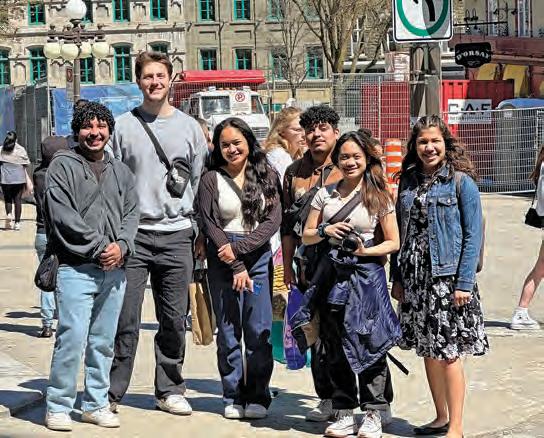
Zoe McCormick with Dr. Darryl Edwards, adjudicator. Dr. Edwards is the Artistic Director of the Centre for Opera Studies in Italy and COSA Canada (Centre for Opera Studies & Appreciation), which are dedicated to the development of emerging opera artists.

Juno Award for Wendy Markosky
Congratulations to Dr. Wendy Markosky who was a performer in the production "Early Italian Cello Concertos" by cellist Elinor Frey and the Rosa Barocca ensemble that won the Juno award for the 2023 Classical Album of the Year, small ensemble category. The award was presented during the Juno opening night awards on March 11 in Edmonton, Alberta.
Dr. Markosky (organ and harpsichord) and former faculty Naomi Burns Delafield (Baroque violin) have performed with the Rosa Barocca ensemble since its acclaimed debut in 2016. Markosky was delighted to participate in the unique collaboration recorded at the University of Calgary's Rozsa Centre during three intense and exhilarating days in September of 2021.
Rosa Barocca presents Alberta audiences with historicallyinformed performances of Baroque music using period instruments to capture the spirit and sound of this significant musical era. Rosa Barocca's 2023 Juno award-winning first CD release (April 2022) with soloist Elinor Frey explored the cello repertoire of the Italian Baroque. It was also nominated for the 2022 ADISQ Classical Album of the Year.
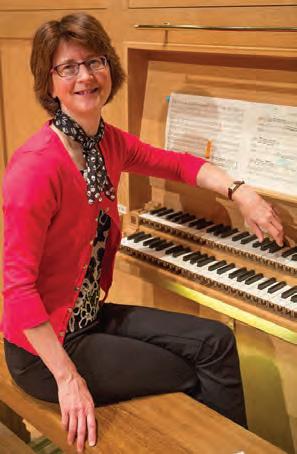
17 | Fall 2023
On a lovely sunny day the tour group enjoyed a few hours to explore Quebec City.
At the Burman Ministry Centre, students become script writers, producers, moderators, and presenters. They learn to run cameras and develop proficiency with audio and lighting techniques. In short, they become competent in all areas of media production and promotion.

Ministry Through the Lens

Although the centre is part of the religious studies department, students and faculty campus-wide are invited to participate, according to Emmanuel-Olivier Jacques, one of the student coordinators. A third-year religious studies major, Jacques says, “Our programming includes inspirational ‘shorts,’ such as devotional talks, and our ‘Famous Evangelistic’ series. Everything we produce can be used at no cost. All we do is free for everyone.
“The centre is very young. We are still in the process of building a crew. Developing more confidence, identifying our primary audience, and creating additional content—these are some of our immediate concerns. Up to now, we have worked with university students and young pastors. So our content speaks mostly to young adults. The plan is to integrate a wider, more varied, demographic.”
Generous donors have provided specialized equipment such as professional-grade cameras, camcorders, microphones, high capacity laptops, and a computer for AMI editing. Jacques admits, “The learning curve is steep. Dr. Stephen Reasor [program chair] and Google have been a tremendous help and my main tutors. Scott Nischuk has been my go-to guy for learning audio. It's incredibly hard to master, but Scott has somehow made me understand some of it.”
New challenges excite Emmanuel. He grew up in Quebec but attended high school in the United States. While being homeschooled when a high school student, he perfected his skills at snowboarding. Any sport, including skateboarding and surfing, that requires a board under his feet presents a challenge.
Perhaps his biggest long-term challenge, he says, is his goal to set up a centre for troubled youth. He envisions a safe space where they will meet other young adults “who are the embodiment of Christ.” His main goal is to give people purpose. For Emmanuel, “life becomes boring, repetitive, and pointless when you are simply roaming around with no purpose.”
In the meantime, Emmanuel Jacques appreciates the potential that the Burman Ministry Centre has for sharing the amazing and transformative power of God’s love with others to give them hope and purpose. The skills he and his fellow students learn will help them in their future ministry.
On the Move
Jonathan (Jon) and Kathleen Campbell have moved to Alberta from the United States. Jon received a BA degree in theology and biblical languages from Walla Walla University, an MA in linguistics from the University of York, and an MDiv from Andrews University. Currently, he is completing a doctoral degree in New Testament studies at Dallas Theological Seminary. He has also served as a youth pastor and head pastor in the Washington conference. Jon's research interests involve ancient New Testament manuscripts and New Testament ethics.
In their spare time, Jon and Kathleen enjoy hiking, board games, and traveling. Their dog, Gromit, is their faithful hiking companion. They are looking forward to exploring Alberta and becoming a part of the Burman family.
After many years of service in pastoral and educational roles, Samuel and Carmen Pagán are excited to be serving God at Burman University. Although originally from Puerto Rico, the Pagáns have made the United States home for the past 30 years. Their daughter, Keren, holds a PhD in Bioethics is married to Ryan Tanguay (DDS). They have a 2-year-old grandson, Isaac, and another one on the way. Samuel and Carmen Pagán enjoy their family, plus biking, hiking, singing, and taking long walks.
The Religious Studies department bids a fond farewell to the Stephen Reasor family. Dr. Reasor has served the
18 | Burman University Magazine / DEPARTMENT NEWS: RELIGIOUS STUDIES /
Burman University campus for the past 18 years in different roles as a chaplain, teacher, and chair of the religious studies program. He has been called back to active duty in the frontlines of pastoral ministry at the College Place Village Seventh-day Adventist Church in College Place, Washington. Steve and his wife, Pattie, and two children, Aeden and Mackenzie, will miss the campus and community. Dr. Reasor looks forward to seeing how the Lord will grow the religious studies program under new leadership and new faculty members.
“But I’m Too Old, God!”
Leonardo Barboza explains that “it all started” when he attended a Seventh-day Adventist church in Ontario. He wanted to learn more about how to study the Bible and how to share with others what he had learned. So he enroled in a program that his church offered, the “School of Evangelism.”
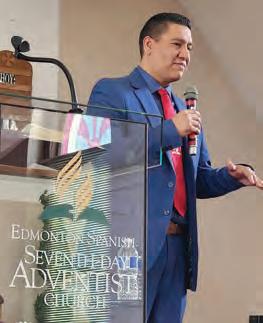

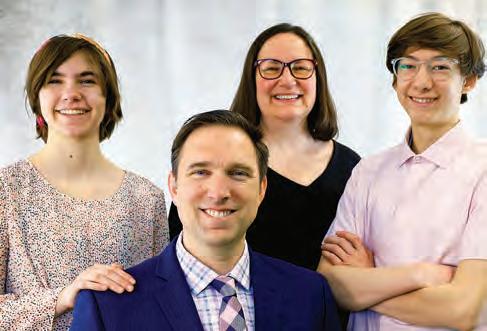
Leonardo was leading out in Bible studies and even preaching occasionally when, to his surprise, his pastor recommended his name to the evangelistic team “Share Him.” The team was holding meetings in Mexico. So Leonardo, who had grown up in Venezuela, shared Christ with the people of Chiapas. He says, “For the first time, I was called pastor. But I told myself, ‘I’m too old to go to school. And I don’t have the money.’ I talked myself out of the idea.”
It seems, though, that God had great plans for him. Years later Leonardo attended a “boot camp” in Florida where he learned
how to organize churches in new areas. Here, he says, he met “a guy who was like my guardian angel. He told me I should be a pastor, and I thought to myself, ‘I’m not holy enough.’
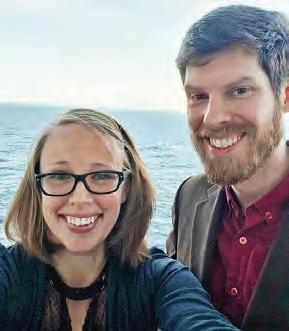
“So I kept talking myself out of it. I told him I was too old. I didn’t have any money. Still he kept encouraging me. I told him I’d pray about it. Well, God opened the door. My friend helped me apply for loans. He helped me apply to school. I remember arriving at Burman University alone after a long four-day drive from Toronto and breaking out in tears. God had worked everything out perfectly!”
Now in his final year as a religious studies major at Burman, Leonardo is spending his second summer working alongside pastors and confirming his call to pastoral ministry. Last summer, he took advantage of the unique field experience that the Burman Ministry Centre offers and worked at the Mount Zion Filipino Church in Toronto.
This year, Leonardo completed the practicum requirements for his program at the Edmonton Central Church. His primary responsibility was shadowing Pastor David Hamstra. He writes, “Wherever he was, I was: at schools, board meetings, prayer meetings, Bible studies and even two weeks at campmeeting. He pitched tents (“it was heavy work, but we had enough guys”), and worked with the media team. (“Everyone was willing to help me learn.”) The highlight was his ordination as a church elder.
Leonardo writes that Burman is giving him the tools he needs through the helpful professors and the classes that are offered. “Working three months during each of two summers helps you see the practical side of pastoral ministry. By God’s grace and thanks to Burman, I’m looking forward to finishing my degree and seeing what God has planned for me next.”
19 | Fall 2023
Jonathan and Kathleen Campbell Samuel and Carmen Pagán The Stephen Reasor Family
While it may seem like a strange decision for me to commute such a great distance and to spend so much of my salary on travel, I am passionate about Christian education. I value the opportunity to be a part of an Adventist educational environment.

When Values Trump Convenience
By Carole Anderson assistant professor of psychology
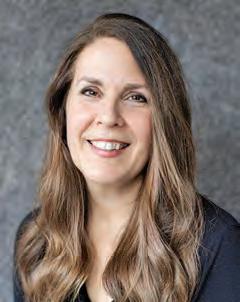

Dr. Carole Anderson, director of Burman’s psychology program development, holds degrees in health psychology, educational psychology, and counselling psychology. Every week, Dr. Anderson commutes to Burman from Vancouver, where she has her professional practice. When asked about her long and unusual commute, Dr. Anderson explains:
I have been in private practice for more than 25 years and have worked with a wide range of concerns facing adults. My health care centre in the Vancouver area houses approximately 25 other health care professionals—mostly counsellors and psychologists. After graduating from Andrews University in Michigan and prior to setting up my own practice, I worked at Simon Fraser University in Vancouver.
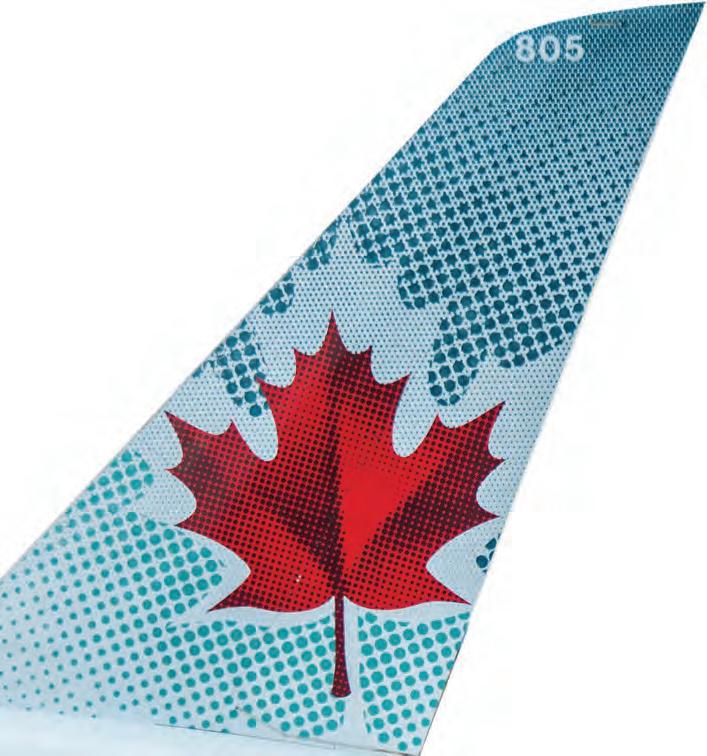

Now I am not only in private practice, but I have also made the decision to be a part of the psychology faculty at Burman University. Although Burman University and Vancouver are a plane ride away, I choose to fly to Burman weekly so that I can teach my students face-to-face. They get to know me, and I get to know them.
Although there are other universities in my home province where I could teach, I have wanted the opportunity to share my knowledge from a Christian perspective. In the years since I took my training, the field of psychology has grown exponentially in its knowledge base. While all the literature presents this newfound knowledge from a secular perspective, I see the hand of God. As I keep abreast of the emerging science in love, relationship, and well-being, the field of psychology is ripe for the integration of the Christian faith. This excites me and has re-energized my interest in psychology.
I also have the privilege of helping to keep Burman’s psychology program current—to ensure that it remains a competitive and rigorous program, providing students with not only essential skills but also the research experience needed to succeed at the graduate level. Undergraduate psychology degrees are very competitive and desirable, and large universities are overflowing with students, all competing for the limited seats in classes and the limited number of research opportunities. Not so at Burman. Our rotation of classes provides a variety of classes for a number of specializations and interests.
Recently, one student told me as we were leaving class, “Our class today on emotion and well-being has really affirmed my faith.” We had spent some time delving into and discussing the psychological literature on a particular emotion and its relevance to the trinity and creation. That comment made my day! And I reflected again on what a privilege and honour it is to teach at Burman University. I love being a part of a team that is providing quality Adventist education in a Canadian environment.
20 | Burman University Magazine / DEPARTMENT NEWS: PSYCHOLOGY /
Robert' s Miracle
Sixteen-year-old Robert was intrigued. If others could win, why not he? He emptied his savings jar. Twelve cents. A one-cent postage stamp would mail an unsealed letter, so he prepared 12. But since he had only six box tops, six letters went into the mail without them.
The timing was perfect. It was the end of the month, so Robert’s 12 letters went into the grand-prize barrel. And one of them (without a box top) was drawn! The quiz question Monty Hall posed was, Name this famous Canadian city: Built on a cliff which towers high Where rolls the mighty river by A city old with letters six
Where the French and English proudly mix
The year was 1949, and Dad Coupland wanted Robert to go to Canadian Union College (CUC) for high school. But the situation seemed impossible. There was absolutely no money. None! Then God miraculously intervened.
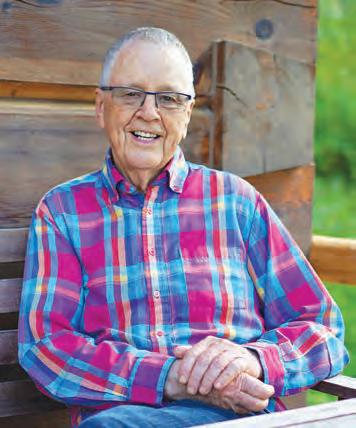
The Coupland family lived on a small farm in Moberly, B.C. near Golden. Robert was the youngest of seven siblings. On wintery Sabbath evenings, their entertainment consisted of gathering around the old battery-operated radio to listen to the “CBC Find Your Fortune” quiz program sponsored by the Ogilvie Oats Company. Monty Hall (who later went on to fame and fortune when he hosted the show “Let’s Make a Deal” in Hollywood) was the host.

Part of the program consisted of someone from the studio audience drawing an entry from a barrel filled with letters. Each letter that was drawn, which included the name and address of a hopeful contestant, had a chance of winning $100. Those letters that also included an Ogilvie box top had a chance at $200.
Once a month, all the letters went into the barrel for a $500 or $1,000 grand-prize draw. The winners of the weekly and monthly draws were required to answer a quiz question correctly by telegram before the next week’s program before the grand prize was awarded.
Dad and Robert looked at each other. They knew immediately: Quebec, of course! Next week, when Monty opened Robert’s telegram and announced, “Correct!” the Coupland family’s jubilation could not be contained.
Robert gave $50 tithe, spent $50 on a typewriter, and started Grade 9 at CUC with the balance. His $400 was spent many times over before Robert graduated from Loma Linda University’s School of Dentistry in 1963. He worked at CUC’s press during each school year until he graduated with a Junior Arts diploma in 1957, and he sold books door-to-door for nine summers until his studies required attending yearround classes.
Now looking back on 90 years of watching God work in his life, Bob muses, “God’s miracle gave me so many friends and such a rewarding career! I am blessed.”
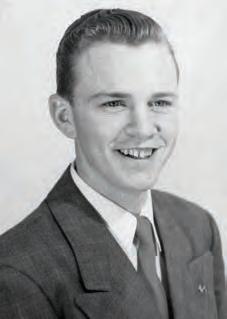
21 | Fall 2023 / ALUMNI FOCUS /
In his retirement Bob enjoys gardening at his Kelowna, British Columbia home.
1960s
Verne U ’68 and Millie (Jamieson) HS ‘60, U ’68 Snow left the hilltop after Vern’s graduation from the theology program to pastor three churches in British Columbia: one in Dawson Creek, the second in Fort St. John, and the third in Chetwynd. Not much later, the B.C. Conference invited Verne to serve as conference evangelist. This invitation began a 38-year-long evangelistic career—not only in Canada, but also throughout North America, Russia, Europe, and South America.
In recalling some of the rewards and challenges of his unique career, Verne says, “The most rewarding experience was to see souls won for Christ's kingdom, of course. The adventure of travelling to new places was very exciting. We never knew what the next city was going to be like or what conditions we would find in the next church. Would there be a harvest of souls in this city? Would our church be prepared to nurture them?”
Even now, in their retirement years, Verne and Millie’s hearts for others is evident in their dedication to service. They have led the Lacombe Food Bank and local thrift store for almost 20 years.

In 2016, Millie was awarded the Lifetime Achievement Award at the Business and Community Awards Gala in Lacombe. Burman recognized Millie
with the Exceptional Volunteer Service award in 2018.
Millie has also received much public recognition for her work with the Red Deer Soup Kitchen which is run through Adventist Community Services.
Their dedication, they say, is simply driven by doing what they enjoy doing: helping others and being part of the community.
1990s
Kirk HS ’89, U ‘94 and Shawna Campbell (att) live in Southern California where Kirk, after 14 years as an administrator in educational technology for Loma Linda University Health, accepted the position as associate vice president for IT service and support at San Diego State University. Concurrently, Dr. Campbell is serving as assistant professor at Loma Linda University School of Public Health.
Shawna, children’s pastor at Loma Linda University Church for the past 12 years, has made a lasting impact on the lives of many. Her passion for empowering young minds led her to publish two books, "More Than Fishy Crackers" and "More Than Balloons," valuable resources for children's ministry.
The Campbells and their two daughters, Teia and Tiana, celebrated a banner year in 2019. Each of them achieved a significant milestone: Kirk earned his Doctorate in Public

Health from Loma Linda University; Shawna, a Masters in Pastoral Ministry from Andrews University; Teia, a bachelor’s degree from La Sierra University; and Tiana, a high school diploma from Loma Linda Academy.
Kirk and Shawna's journey began at Burman University, where they met and started dating during their freshmen year. They write, “As we are celebrating our 30th wedding anniversary, we are immensely grateful to Burman University for the opportunities it provided us to meet, learn, and grow spiritually, personally, and professionally.”
Kirk and Shawna are committed to making a positive difference in their church, their community, and their professions. They have volunteered in hospitals, soup kitchens, and churches, and served on many boards and committees over the years.
2000s
Royce Odiyar U ‘05 attended the ARISE Training Institute in Michigan after graduating from Burman’s theology program. Subsequently, he worked as a Bible worker, and then, in 2008, he co-led a churchplant endeavour in North Vancouver, British Columbia. After this experience, Royce took a three-year break from pastoral ministry and served as a treasurer/bookkeeper and volunteer chaplain at Okanagan Christian School in Kelowna, B.C.
Returning to pastoral ministry in 2013, he pastored in the North Okanagan for three years before attending Andrews University to earn a Master of Divinity degree and a Master of Arts in Communication.
Over the years. Royce has travelled internationally on numerous mission trips and credits his first mission trip to Pueblo, Mexico as instrumental in his conversion experience. He is passionate about preaching/ teaching, digital outreach, working with young people and Christian education.
Royce currently pastors a threechurch district in Central British Columbia. On August 5, 2023, the British Columbia Conference of Seventh-day Adventists publicly recognized Royce’s dedication to ministry at a special ordination service at the B.C. Campmeeting in Hope, B.C.

Royce, Michelle, and their five-year-old son, Jesiah, live in Salmon Arm, B.C.

2010s
Kendra (Hill) Montes HS ’09, U ’14 and Pablo Montes U ’14 Kendra studied pharmacy at the University of Alberta and graduated in 2019. She works at a Shoppers Drug Mart in Edmonton, Alberta. During the COVID-19 pandemic, Kendra was a contact tracer. She writes, “Between that and administering hundreds of vaccines at Shoppers Drug Mart, I felt like I was having a direct impact on the front
22 | Burman University Magazine / ALUMNI PROFILES /
Verne and Millie Snow Kirk and Shawna Campbell with daughters Teia and Tiana
Royce, Michelle, and Jesiah Odiyar
lines—something I found very rewarding.”
She explains that she chose pharmacy because “I have more of a work-life balance than a career in medicine would provide.” When asked how well Burman prepared her for a career in pharmacy, she points to the strong science program at Burman. She adds, “I also appreciate the social consciousness that my education provided.”
Pablo is a professional musician and educator. He recently returned from post-graduate studies in historical bassoons at the FHNW, Schola Cantorum Basiliensis, Switzerland. During his year overseas, Pablo worked throughout Europe with colleagues from around the world. He writes, “My most exciting project was an audio/ video recording funded by the Department of Culture and Kunstuniversität Graz. My time in Europe was amazing and I would return if given the opportunity.”
In the meantime, Pablo is part of a group of pioneers who are sharing their appreciation for historical music around Alberta. He writes, “Early music is far more appreciated in Europe than here.” To change that, Pablo teaches. He also coaches students for the Alberta Honour Band. And he has worked with the Edmonton symphony on their Adopt a Player program that brings local musicians to elementary schools to guide students through the process of creating a musical composition.
For Pablo, “Dr. Markosky was my most influential professor. She is now an amazing colleague in early music projects.”
Konstantin Neykurs U ‘09 is a chartered public accountant (CPA) and partner at Pivotal LLP in Red Deer, Alberta. He joined the company in 2010 as a junior accountant, but advanced quickly. In 2017, he was invited to become a partner.

He writes, “As partner at a public accountant firm, I wear many hats. My two primary objectives are first, to give my clients the best, most up-to-date advice and services. And second, as part of the management team, to ensure the growth and longterm sustainability of the firm.”
Although being a tax accountant requires a commitment to life-long learning (tax rules and regulations are constantly changing), Konstantin finds the challenges of solving his client’s problems and saving them money satisfying and rewarding. He adds, “Alberta’s current market demands for CPAs are high. My best advice to anyone contemplating an accounting career is to do your research. Find a position that will give you the best tools for building your career.”
2020s
Paola Madrigal U ’20 writes, “I have taught and supported youth, first as classroom teacher, and most recently, as a student academic advocate with
Songhees First Nation.” In that role, she helped implement the Local Education Agreement, a partnership between the Nation and the local school district outlining initiatives to support Songhees youth’s success in school.
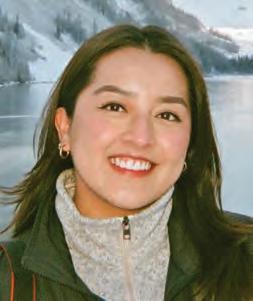
Paola worked closely with students to amplify their voices to administrators and to foster connections between students and teachers. A significant part of her work centred on advocating on students' behalf. She writes, “Songhees students have a greater chance at success when their teachers have an empathetic understanding of life on a reservation. Students also need targeted literacy intervention and accommodations for cultural events.” So Paola advised educators on how to engage Songhees students’ families in a culturally responsive manner to enhance relations between school and these families.
“This fall,” she says, “I will be pursuing a Master of Education in Social Justice at the Ontario Institute for Studies in Education at the University of Toronto. I am excited to take this next step in my career and dive further into intersectional issues in education.”
Elisa Vital U ‘20 Elisa’s master’s degree in public and international affairs is from the University of Ottawa. Her thesis, “Racialization and U.S. Immigration Law: The Case of Latinx Unaccompanied Children at the U.S.-Mexico Border,” examines the intersectionality
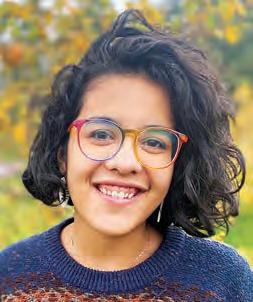
of race and law that influences the perception and treatment of undocumented children.
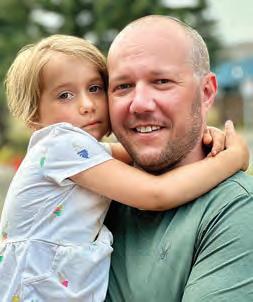
While completing her graduate studies, Elisa worked at the Department of National Defence (DND). She analyzed programs to offer comprehensive recommendations to senior leadership. Primarily, she worked with files related to NATO relations, Arctic Security, Gender Based Analysis Plus (GBA+) in defence, and defence procurement.
Since last November, Elisa has been employed with Canada Border Services Agency (CBSA) as a policy analyst. She writes, “At CBSA, I engage in ministerial and intergovernmental consultations to foster international cooperation and engagement on migration and crisis response-related issues. Given recent developments in Sudan, Afghanistan, and Ukraine, CBSA is focusing a lot of attention on fostering good relations with Canada’s partners at home and abroad.
“I would like to continue my career in the migration space for as long as possible, especially as we continue to see a rise in geopolitical crises around the world. Joining the public service has allowed me to put my studies into practice and to further hone my passion for human rights and humanitarian responses which is something I’m deeply grateful for.”
To participate in Alumni Profiles, send your information to riekrause@gmail.com.
23 | Fall 2023 / ALUMNI PROFILES /
Konstantin Neykurs with daughter Vera Paola Madrigal Kendra and Pablo Montes
Elisa Vital
TD Insurance



Meloche Monnex
An
God’s Heroes
A Tribute to Bob and Myrna Tetz

Just before his death on June 10, 2023, Palmer Gale “Bob” Tetz wrote a letter to the two churches he had pastored in his retirement. He said, “I asked the Lord to give me one day longer than my wife, so I could look after her. He has given me several months. I praise him for the life that he has given me, and the privilege of service.” Myrna went to her rest on October 19, 2022.
Take advantage of your alumni benefits!
Married since 1959, Bob and Myrna Tetz’s lives took many unexpected twists and turns. They became known for their extraordinary ministry. Bob’s pastoral career included leading more than a dozen churches. During a ten-year stint at the Vancouver Central church, Bob created and hosted Lifestyle Line, a weekly radio talk show focused on health and wellness. He also served as youth director of the British Columbia Conference, where he revitalized the summer camp program and helped establish a permanent location. And he spent seven years as vice president for advancement at Burman University, and was the primary fundraising force behind the construction of the Chan Shun Science Centre.
Myrna, too, devoted her life to family, community, and church. As communications director for the British Columbia Conference, and the first woman to serve in that position, she spearheaded numerous innovative outreach programs—from health fairs and cooking courses to wellness screenings at Expo ‘86. Most prominently, she served for five years as managing editor of the Adventist Review, the worldwide magazine of the Seventh-day Adventist church.
Inspiring and creating opportunities for young people was one of Myrna’s passions. For eight years, as vice president for recruitment at Burman University, she represented the institution across Canada and internationally, and helped take enrolment to record levels.
In his final letter, Bob writes, “I look forward to what God has planned for all of us when we make him our friend and pray for everyone who is reading this to make Him central in their lives.” He ends with an invitation to “meet at the Eastern Gate” of the New Jerusalem. Which eastern gate? He says, “I’m sure there will be a monitor” to direct everyone. It promises to be quite a crowd!
24 | Burman University Magazine
exciting benefit for you as a Burman graduate!
You have access to the TD Insurance Meloche Monnex program. This means you can get preferred insurance rates on a wide range of home, condo, renters, and car coverage that can be customized. For over 65 years, TD Insurance has been helping Canadians find quality insurance solutions. Feel confident your coverage fits your needs. You save with preferred insurance rates. Get a quote now.
The TD Insurance Meloche Monnex program is underwritten by SECURITY NATIONAL INSURANCE COMPANY. It is distributed by Meloche Monnex Insurance and Financial Services, Inc. in Québec, by Meloche Monnex Financial Services Inc. in Ontario, and by TD Insurance Direct Agency Inc. in the rest of Canada. Our address: 50 Place Crémazie, 12th Floor, Montréal, Québec H2P 1B6. Due to provincial legislation, our car and recreational insurance program is not offered in British Columbia, Manitoba or Saskatchewan. Wide Horizons Solution® travel insurance is administered by RSA Travel Insurance Inc. and is underwritten by Royal & Sun Alliance Insurance Company of Canada. Medical and claims assistance, claims payment and administrative services are provided by the administrator described in the insurance policies. All trade-marks are the property of their respective owners.® The TD logo and other TD trade-marks are the property of The Toronto-Dominion Bank. Insurance program recommended by HOME | CAR |
Get a quote and see how much you could save! Call 1-888-589-5656 or go to tdinsurance. com/burman.
CONDO | TRAVEL
/ ALUMNI TRIBUTE /
Betty Hafner Abraham HS‘62 December 29, 2016
Wayne Abraham (att) January 15, 2021
Barry Bechthold HS‘62 March 10, 2023
Anne Connelly Bissell staff July 11, 2022
Ray Chudey (att) March 1, 2018
Tammy Unruh Clarke HS‘97, U‘01, staff December 31, 2022
Harvey Dalke (att) March 17, 2023
Deva Doss staff May 21, 2022
Theodore (Ted) Edes (att) June 9, 2022
June Fiorito staff October 29, 2022
Sue Reimche Flint U‘62 August 28, 2022
Jean Klokeid Garner HS‘50 August 14, 2022
Henry Gerber HS’57, U‘59 March 7, 2023
Cheryl Bergey Goodburn HS‘75 September 2, 2022
Florence Rowe Hanson HS‘49 November 11, 2022
Olive Fisher Hoehn HS’40 June 6, 2013
Jane Murdoch Igler HS‘54, U‘56, staff June 20, 2018
Paul Ilchuk (att) January 26, 2023
Daniel Jackson HS’67, U‘71 July 23, 2022
Betty Gieck Jacobson HS‘83 May 18, 2020
Evelyn Karpow Kay (att), staff Sept. 12, 2022
Zelma Carlson Kay HS‘43, U‘44 May 28, 2023
Walter King (att) April 17, 2013
Herman Kneller HS‘44 DoD unknown
Don Lamming HS‘63 August 15, 2022
Donn Leatherman U‘74 September 6, 2022
Agnes Grosso Lyzanchuk HS‘45 July 27, 2022
Elsie Lamming Martin HS‘50 January 1, 2023
Burman University notes with sadness the passing of the following alumni and staff (based on information received between June 2022 and June 2023):
In Memoriam
Russell (Mac) Martin (att) June 1, 2022
Ronald Neish (att) March 9, 2023
Ernie Nolan staff February 22, 2023
Olavi Orpana U‘61 January 18, 2023
Clifford Patterson (att) May 24, 2023
Ernestine Brandt Reid HS‘47, U‘48 March 27,2022
Bevin Sayler HS‘76 Mach 20, 2023
Norman Sayles (att) February 7, 2022
William (Bill) Scollie HS‘60 DoD unknown
Ron Siemens HS‘74 February 10, 2023
Arthur Spenst U‘48 June 27, 2022
Arthur Spenst U‘55 January 8, 2023
Dorothy Cooper Spenst HS‘48 March 21, 2023

Roland Stickle U‘56 June 4, 2022
Don Stoyanowski (att) May 6, 2023
Howard Sulzle HS’58 July 2, 2023
Anne Krause Tetz, HS‘44, U‘46 July 21, 2022
Myrna Johnson Tetz U‘53, staff October 19, 2022
Palmer (Bob) Tetz U‘62, staff June 10, 2023
Hedwig Kneller Toombs U‘54 DoD unknown
William Tym HS‘54, U‘55 January 11, 2023
Shirley Dobroskay Vaughn HS‘68 March 15, 2023
Sharon Polishuk Waite HS‘61 July 23, 2022
Mavis Gimbel Weisner (att) July 11, 2022
Glen Wilson HS‘77, U‘83 October 17, 2022
Lillian Rambo Wysong HS‘49 October 31, 2022
William (Bill) Yuros U‘64 November 5, 2021
Heidi Zayachkowski HS‘98 July 21, 2022
Where
Burman is Canada’s only Seventh-day Adventist university. Academic excellence grounded in a Christ-centred worldview is what Burman offers to every student. But such an education is possible only through gift support.

The Believe in Burman annual fund welcomes your participation as you assist the University in the fulfillment of its mission. Your generous gifts help provide funding for critically needed projects that range from entrance scholarships to technology upgrades, from faculty research and program support to campus improvements and much more.

Burman University 6730 University Drive Lacombe, AB Canada T4L 2E5 (800) 661-8129 www.burmanu.ca
will they be after graduation?
Ways to make your gift By mail 6730 University Drive, Lacombe, AB, T4L 2E5 By
By E-Transfer etransferdonation@burmanu.ca By cash In your church offering plate on October 31 Donate online at www.burmanu.ca/alumni/give or www.canadahelps.ca Believe in Burman • Annual Fund, October 28
phone 403.786.2533








































































